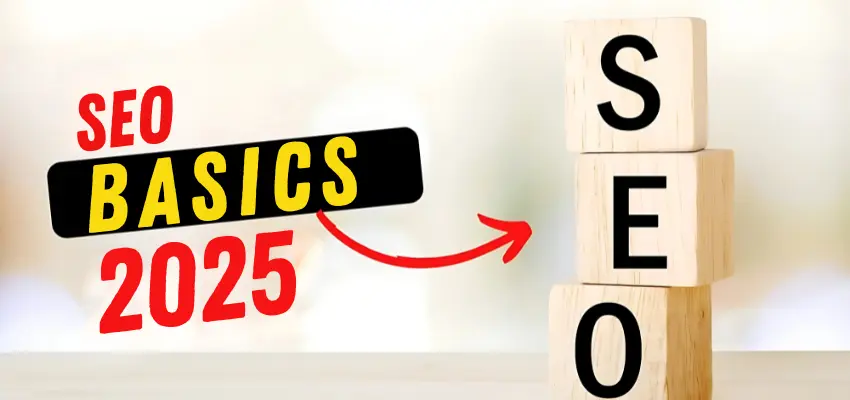SEO, or Search Engine Optimization, is the backbone of digital marketing. It determines how easily your audience can find you on search engines like Google. In 2025, with ever-evolving algorithms and AI-driven search technologies, understanding SEO basics is more crucial than ever. This guide will walk you through essential SEO fundamentals and how to implement them for maximum results.

1. What is SEO and Why It Matters in 2025?
SEO is the process of optimizing your website to rank higher in search engine results pages (SERPs). A well-optimized site attracts more organic traffic, leads, and sales without the need for paid ads.
Why SEO is Essential in 2025
Increased Competition: More businesses are investing in SEO.
Zero-Click Searches: Users are getting answers directly on SERPs.
Voice Search Growth: Optimizing for conversational queries is crucial.
AI Integration: Search engines use AI to understand intent better.
2. Keyword Research: The Foundation of SEO
How to Find the Right Keywords
Finding the right keywords involves understanding what your audience is searching for. Use tools like Google Keyword Planner, Ahrefs, or Semrush.
Steps to Perform Keyword Research:
Identify seed keywords relevant to your business.
Use keyword tools to find related terms.
Analyze search intent (informational, navigational, transactional).
Focus on long-tail keywords for better conversion rates.
Check out our detailed guide on Effective Keyword Research for step-by-step instructions.
3. On-Page SEO Essentials
On-page SEO involves optimizing individual pages to rank higher.
Key Elements:
Title Tags: Include the focus keyword and keep it under 60 characters.
Meta Descriptions: Write compelling summaries that encourage clicks.
Headings (H1, H2, H3): Use keywords naturally.
URL Structure: Keep URLs clean and descriptive.
Internal Linking: Connect related pages to improve navigation and SEO.
4. Technical SEO: Optimizing Behind the Scenes
Technical SEO ensures search engines can crawl and index your site efficiently.
Must-Have Technical SEO Practices:
Mobile Optimization: Use responsive design.
Core Web Vitals: Focus on site speed, responsiveness, and visual stability.
Secure Your Site: Use HTTPS.
Create an XML Sitemap: Submit it to Google Search Console.
Fix Crawl Errors: Regularly check and resolve issues.
Tool Recommendation: Use Google Search Console to monitor technical SEO health.
5. Content is King: Create High-Quality Content
Content drives traffic and keeps users engaged. Create content that addresses user intent and provides value.
How to Create SEO-Friendly Content:
Research your audience’s questions.
Use clear headings and short paragraphs.
Incorporate keywords naturally.
Add images with alt text.
Update old content to stay relevant.
6. Building Quality Backlinks
Backlinks from reputable sites signal authority to search engines.
Strategies to Earn Backlinks:
Guest blogging on reputable websites.
Creating shareable infographics.
Participating in industry forums.
Reaching out to partners for link exchanges.
Warning: Avoid buying backlinks; it can harm your SEO.
7. Tracking and Measuring SEO Success
You can’t improve what you don’t measure. Use tools to track your SEO performance.
Tools to Use:
Google Analytics: Monitor traffic and user behavior.
Semrush: Analyze keyword rankings and competitor strategies.
Ahrefs: Track backlinks and domain authority.
Google Search Console: Monitor indexing and search performance.
FAQs
1. How long does SEO take to show results?
SEO typically takes 3-6 months to show noticeable improvements, depending on competition and strategy.
2. Is SEO better than paid advertising?
Both have their place. SEO offers long-term benefits, while paid ads provide immediate visibility.
3. What are long-tail keywords?
Long-tail keywords are longer, specific phrases that users search for. They often have lower competition and higher conversion rates.
4. Why is mobile optimization important for SEO?
With over 60% of searches coming from mobile devices, a mobile-optimized site improves user experience and rankings.
5. How often should I update my content?
Regular updates (every 3-6 months) keep content relevant and competitive.
Conclusion
Mastering SEO basics in 2025 is essential for any business aiming to thrive online. By focusing on keyword research, on-page and technical SEO, content creation, and backlink strategies, you can significantly improve your website’s visibility.
Ready to boost your SEO game? Schedule a Free Website Audit with CG Marketing and let our experts guide you to higher rankings!
